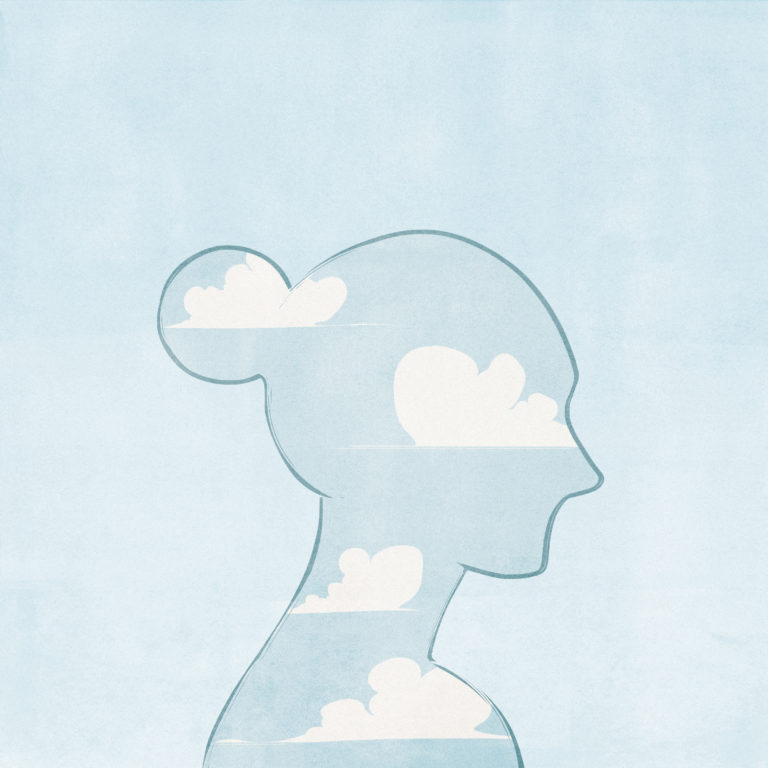Silence is not a luxury. It’s essential.
Gordon Hempton

First — take a deep breath in. Breathe out. A brain spa and respite await.
Illustration by Andrea Ucini.
Silence is not a luxury. It’s essential.
Gordon Hempton
We’ve realized in 2020 that the way we’ve organized culture — from the economy to race to work — could be done radically differently. We’ve been modeling our life together on “survival of the fittest” long after science itself moved on from that. And we’re learning to see that in every sphere of life we inhabit ecosystems. Agustín Fuentes brings spacious insight into all of this as a biological and evolutionary anthropologist, exploring how humans behave, function, and change together. In this conversation, he is full of refreshingly creative and practical fodder for the necessary reinvention ahead.
What stories or myths bring you strength?
This poem tells the story of a person living with invisible chronic pain who finds unexpected fortitude from a girl dressed as a superhero. Their encounter, “at the swell of the muddy Mississippi,” doesn’t have a fantasy ending, but instead finds strength and glory in bodies and myth.
No conversation we’ve ever done has been more beloved than this one. The Irish poet, theologian, and philosopher insisted on beauty as a human calling. He had a very Celtic, lifelong fascination with the inner landscape of our lives and with what he called “the invisible world” that is constantly intertwining what we can know and see. This was one of the last interviews he gave before his unexpected death in 2008. But John O’Donohue’s voice and writings continue to bring ancient mystical wisdom to modern confusions and longings.
As we reflect back on 2020 and look ahead, how do we keep walking forward, and even find renewal along the way? How can we hold to our sense of what is whole and true and undamaged even in the face of loss? Sharon Salzberg is one of the most esteemed meditation teachers in the world. She speaks with Krista about how to care for the world while also learning kindness towards ourselves.
For us to transform as a society, we have to allow ourselves to be transformed as individuals. And for us to be transformed as individuals, we have to allow for the incompleteness of any of our truths and a real forgiveness for the complexity of human beings.
angel Kyodo williams
Jason Reynolds is the National Ambassador for Young People’s Literature of the Library of Congress — and a magnificent source of wisdom for human society as a whole. He’s driven by compassion and the clear-eyed honesty that the young both possess and demand of the rest of us. Ibram X. Kendi chose him to write the YA companion to Stamped from the Beginning. In his person, Jason Reynolds both embodies and inspires innate human powers of fortitude and imagination. Hear him on “breathlaughter”; the libraries in all of our heads; and a stunning working definition of anti-racism: “simply the muscle that says humans are human… I love you, because you remind me more of myself than not.”
We’re increasingly attentive to the many faces of depression and anxiety, and we’re fluent in the languages of psychology and medication. But depression is profound spiritual territory; and that is much harder to speak about. This is an On Being classic. Krista opens up about her own experience of depression and talks with Parker Palmer, Anita Barrows, and Andrew Solomon. We are putting this out on the air again because people tell us it has saved lives, and so many of us are struggling in whole new ways right now.
This is what was bequeathed us:
This earth the beloved left
And, leaving,
Left to us.
No other world
But this one:
Willows and the river
And the factory
With its black smokestacks.
No other shore, only this bank
On which the living gather.
No meaning but what we find here.
No purpose but what we make.
That, and the beloved’s clear instructions:
Turn me into song; sing me awake.
“This is what was bequeathed us” from How Beautiful the Beloved by Gregory Orr. Copyright © 2009 by Gregory Orr. Originally published by Copper Canyon Press. Used with the permission of the poet.
This poem was originally read in the On Being episode “Shaping Grief With Language.”
Watch a poetry film version of this on our YouTube channel.
Search results for “”
Filters
/